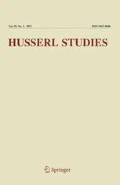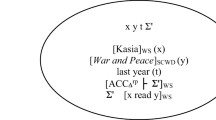Abstract
The essay introduces a non-Diodorean, non-Kantian temporal modal semantics based on part-whole, rather than class, theory. Formalizing Edmund Husserl’s theory of inner time consciousness, §3 uses his protention and retention concepts to define a relation of self-awareness on intentional events. §4 introduces a syntax and two-valued semantics for modal first-order predicate object-languages, defines semantic assignments for variables and predicates, and truth for formulae in terms of the axiomatic version of Edmund Husserl’s dependence ontology (viz. the Calculus [CU] of Urelements) introduced by The Ontology of Intentionality I & II. It then uses the §3 results to define the modalities of truth, and §5 extends the semantics to identity claims. §6 defines and contrasts synthetic a priori truths to analytic a priori truths, and §7 compares Brentano School noetic semantic and Leibnizian possible-world semantic perspectives on modality. The essay argues that the modal logics it defines semantically are two-valued, first-order versions of the type of language which Husserl viewed as the language of any ontology of experience (i.e. of any science), and conceived as the logic of intentionality.
Similar content being viewed by others
References
Becker, O. (1930). Zur Logik der Modalitäten. In E. Husserl’s (Ed.), Jahrbuch für Philosophie und Phänomenologische Forschung (Vol. 11, pp. 497–548).
Brentanto, F. C. (1973). Psychology from an Empirical Standpoint, A. C. Rancurello, D. B. Terrel, & Linda McAlister, Trans. London and New York: Routledge & Kegan Paul.
Burtt, E. A. (1954). The metaphysical foundations of modern science (2nd ed.). (1932). NY: Doubleday Anchor.
Chisholm R. (1957) Perceiving: A philosophical study. Cornell University Press, NY
Freddoso A. (1978). Abailard on collective realism. Journal of Philosophy 75: 527–538
Gurwitsch A. (1974) Phenomenology and the theory of science (Ed. L. Embree). Evanston: Northwestern University Press
Hughes G.E., Cresswell M.J. (1968) An introduction to modal logic. London: Methuen & Co. Ltd
Hughes G.E., Cresswell M.J. (1996) A new introduction to modal logic. London: Routledge
Hume D. (1888) A treatise of human nature (Ed. L. A. Selby-Bigge). London: Oxford at the Clarendon Press
Husserl, E. (1970). Logical investigations (1901) (2nd ed., J. N. Findlay, Trans. Vol. I, II). NY: Humanities Press.
Husserl E. (1972) Erfahrung und Urteil (Ed. L. Landgrebe). Hamburg: Felix Meiner Verlag
Husserl, E. (1973). Experience and judgment (Ed. L. Landgrebe, J. Churchill and K. Ameriks, Trans.). Evanston: Northwestern University Press.
Husserl, E. (1981). The phenomenology of internal time-consciousness [1905 Vorlesungen zur Phänomenologie des inneren Zeitbewu§tseins] (Ed. M. Heidegger, J. Churchill, Trans.). Bloomington: Indiana University Press.
Husserl, E. (1982). Ideas pertaining to a pure phenomenology and to a phenomenological philosophy (F. Kersten, Trans.). The Hague: Martinus Nijhoff.
Kant I. (1965) Critique of pure reason (Norman Kemp Smith, Trans.). NY: St. Macmillan & Co
Pasnau R. (2002) The Cambridge translations (Vol. III). Cambridge: Cambridge University Press
Prior A. (1967) Past, present, and future. Oxford: Oxford University Press
Tarski, A. (1956). The concept of truth in formalized languages. In Logic, Semantics, Metamathematics: Papers from 1923 to 1938 (J. H. Woodger, Trans.). NY: Oxford at the Clarendon Press.
Author information
Authors and Affiliations
Corresponding author
Rights and permissions
About this article
Cite this article
Null, G.T. Two-Valued Logics of Intentionality: Temporality, Truth, Modality, and Identity. Husserl Stud 23, 187–228 (2007). https://doi.org/10.1007/s10743-007-9028-9
Received:
Revised:
Accepted:
Published:
Issue Date:
DOI: https://doi.org/10.1007/s10743-007-9028-9



